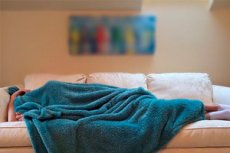New publications
How to fall asleep faster and how much sleep?
Last reviewed: 29.06.2025

All iLive content is medically reviewed or fact checked to ensure as much factual accuracy as possible.
We have strict sourcing guidelines and only link to reputable media sites, academic research institutions and, whenever possible, medically peer reviewed studies. Note that the numbers in parentheses ([1], [2], etc.) are clickable links to these studies.
If you feel that any of our content is inaccurate, out-of-date, or otherwise questionable, please select it and press Ctrl + Enter.

Almost all doctors unequivocally advise to spend enough time on sleep, because its deficit has an extremely negative impact on people's health. At the same time, as it turns out, excessively long sleep is no less harmful.
Scientists from the UK have drawn a parallel between the speed of falling asleep, duration and quality of night rest, taking into account the risk of cardiovascular pathologies. In general, the results of more than seven dozen studies involving three million people were analyzed.
At the end of the project, scientists found out that sleeping for more than eight hours increases the risk of cardiovascular problems. In this case, the degree of risk increases in proportion to the duration of sleep. In addition, the researchers concluded that sleeping more than eight hours is more dangerous than sleeping less than seven hours.
In particular, weight gain is associated with both a deficit and excess of night rest, which previously few people talked about. In addition, there is data on the loss of productivity during the working day, which is also associated with excessive love of sleep. Labor productivity was assessed, among other things, by general health, financial capacity, other work problems and so on. The following conclusions were drawn from the study: both sleep deficiency and sleep excess significantly reduce labor productivity. In particular, if a person sleeps too long, his or her productivity decreases by about a quarter of his or her capacity.
What do experts recommend? There are many recommendations for normalizing rest and wakefulness, for example:
- Determine a "sleep schedule" for yourself, set an approximate time to go to bed and wake up in the morning, including on weekends.
- Exercise regularly - preferably in the morning or at least at least two hours before bedtime.
- Eat a healthy diet and do not eat too much before going to bed. Have a light and healthy snack before bedtime (e.g. An apple or a glass of kefir).
- Limit your caffeine intake throughout the day (optimally no more than a couple cups of coffee a day).
- You should not use the TV, computer, or phone before bedtime.
- The bed should be comfortable, clean and the bedroom should be effectively darkened. It is important to limit the intake of light and extraneous sounds during a night's rest.
- It is important to relax completely, to push away negative thoughts. You can use meditation.
It is undesirable to use alcoholic beverages as sleeping pills. Often they do help to fall asleep quickly, but such rest will be of poor quality, intermittent, restless: under the influence of alcohol, a person will sleep, and his brain will not rest. Another unfavorable factor is that alcohol, relaxing the muscles, does the same with the throat muscles, which leads to snoring and breath-holding (apnea).
For more information, please visit.
